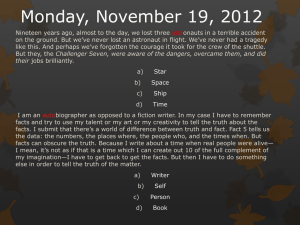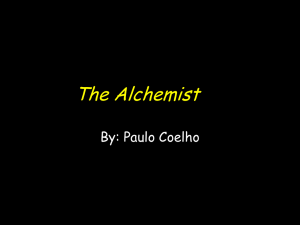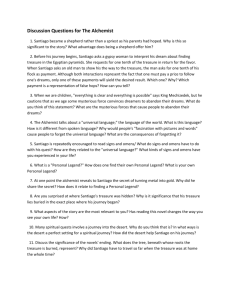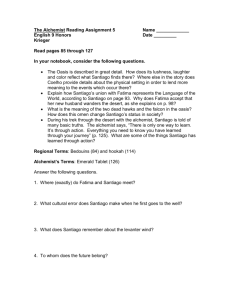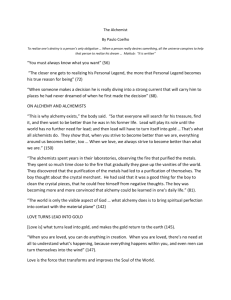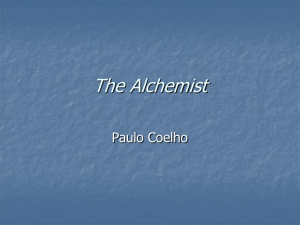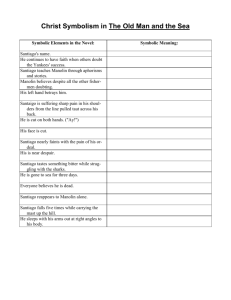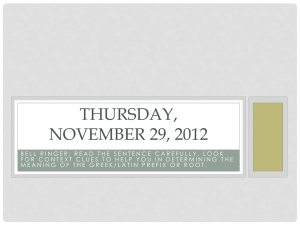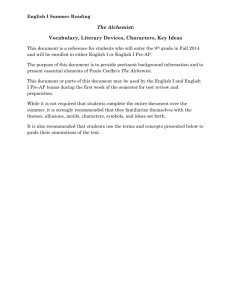Study Guide - Nueva English
advertisement
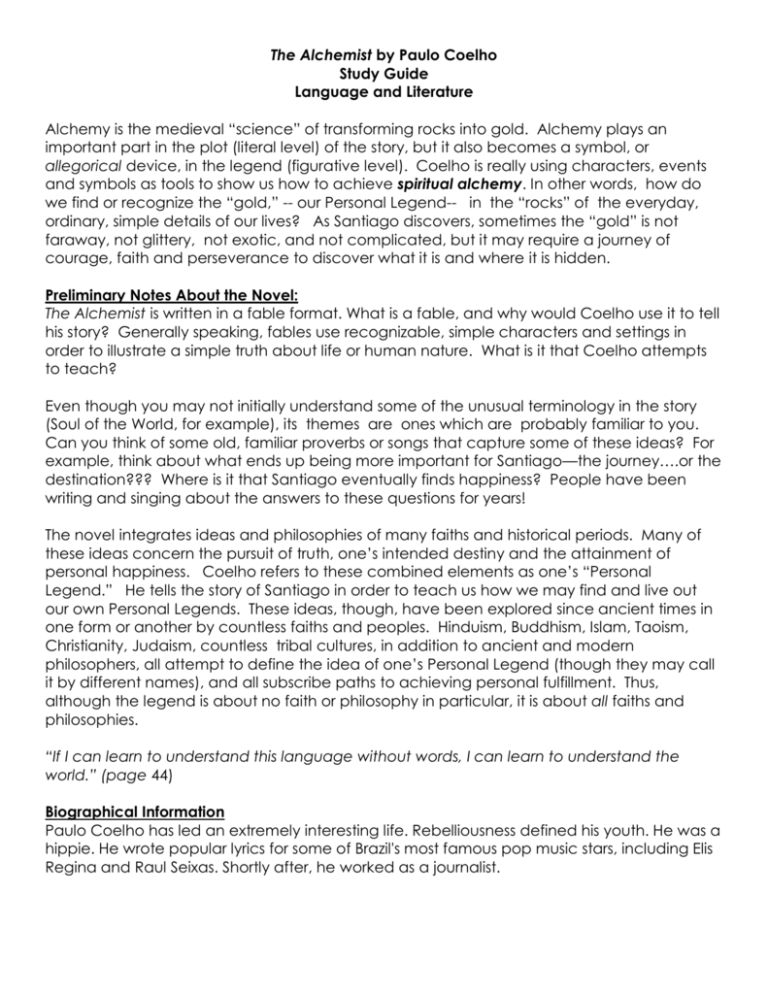
The Alchemist by Paulo Coelho Study Guide Language and Literature Alchemy is the medieval “science” of transforming rocks into gold. Alchemy plays an important part in the plot (literal level) of the story, but it also becomes a symbol, or allegorical device, in the legend (figurative level). Coelho is really using characters, events and symbols as tools to show us how to achieve spiritual alchemy. In other words, how do we find or recognize the “gold,” -- our Personal Legend-- in the “rocks” of the everyday, ordinary, simple details of our lives? As Santiago discovers, sometimes the “gold” is not faraway, not glittery, not exotic, and not complicated, but it may require a journey of courage, faith and perseverance to discover what it is and where it is hidden. Preliminary Notes About the Novel: The Alchemist is written in a fable format. What is a fable, and why would Coelho use it to tell his story? Generally speaking, fables use recognizable, simple characters and settings in order to illustrate a simple truth about life or human nature. What is it that Coelho attempts to teach? Even though you may not initially understand some of the unusual terminology in the story (Soul of the World, for example), its themes are ones which are probably familiar to you. Can you think of some old, familiar proverbs or songs that capture some of these ideas? For example, think about what ends up being more important for Santiago—the journey….or the destination??? Where is it that Santiago eventually finds happiness? People have been writing and singing about the answers to these questions for years! The novel integrates ideas and philosophies of many faiths and historical periods. Many of these ideas concern the pursuit of truth, one’s intended destiny and the attainment of personal happiness. Coelho refers to these combined elements as one’s “Personal Legend.” He tells the story of Santiago in order to teach us how we may find and live out our own Personal Legends. These ideas, though, have been explored since ancient times in one form or another by countless faiths and peoples. Hinduism, Buddhism, Islam, Taoism, Christianity, Judaism, countless tribal cultures, in addition to ancient and modern philosophers, all attempt to define the idea of one’s Personal Legend (though they may call it by different names), and all subscribe paths to achieving personal fulfillment. Thus, although the legend is about no faith or philosophy in particular, it is about all faiths and philosophies. “If I can learn to understand this language without words, I can learn to understand the world.” (page 44) Biographical Information Paulo Coelho has led an extremely interesting life. Rebelliousness defined his youth. He was a hippie. He wrote popular lyrics for some of Brazil's most famous pop music stars, including Elis Regina and Raul Seixas. Shortly after, he worked as a journalist. In 1986 Paulo Coelho walked the Road to Santiago, a medieval pilgrim's route between France and Spain. He later described this experience in ‘The Pilgrimage’, published in 1987. The following year, his second book ‘The Alchemist’ established his worldwide fame. Literary Terms and Concepts (review) • • • • • • • • • Characterization Allusion Symbol Allegory Archetype Metaphor/Simile Foreshadowing Theme Motif Themes and Motifs Love is described as a part of the Soul of the World. Love occurs in life and Nature. As everything supports each other, they love each other. Santiago tells the desert that it shows love for the alchemist's falcon by offering it game, after which the falcon shows love to man as it offers the game to eat, and the man shows love for the desert as after one dies, his body is reintegrated into the desert sands. There is also love in people, demonstrated by Santiago's love of Fatima's beauty, and Santiago's knowing that it is part of his Personal Legend to love her. Also, there is true love, a brief definition given by the alchemist; "True love is love that allows you to reach your Personal Legend." In The Alchemist, a kind of spiritual enlightenment is accomplished by fulfilling one's Personal Legend, and adding to the Soul of the World, which is the "light" of most religions. The spiritual influence of this book is omniscient, for example in Santiago's "turning himself into the wind" stunt. He learns the Language of the World, which is basically the language of the Soul of the World. As the Soul of the World is related to the Soul of God, Santiago is able to perform miracles after he has reached into the Soul of the World. Fate is constantly intertwined with will, and a key theme of the book focuses on how much in life is under one's control, and how much is controlled by fate. The old king states that the world's greatest lie is that "at some point during our lives, we lose control of what's happening to us, and our lives become controlled by fate." The Personal Legend is a being's reason to live. Everything in the world has a Personal Legend, and by reaching one's Personal Legend, one adds to the Soul of the World, the purity of the world. The boy's Personal Legend is obvious, to find his treasure at the Egyptian pyramids. The alchemist fulfilled his Personal Legend, to become a true alchemist and accomplish the Master Work. The crystal merchant's Personal Legend is to visit Mecca, and the Tarifa baker's Personal Legend is to travel the world. The Personal Legend of a person surfaces at childhood, and one can never find true happiness without fulfilling it. The Personal Legend of Santiago drives him to his treasure as he chooses to accomplish his Personal Legend, just as the alchemist’s was to become the most famed alchemist in the world. Others, like the Tarifa baker and the crystal merchant, choose to ignore the Personal Legend, and thus shape their life to be forever wanting. Being able to observe and read omens is a key motif throughout the book. Santiago recognizes the hole in his pouch through which Urim and Thummin fell in Tangier as an omen, as he had promised the old king that he would make his own decisions, not let the stones do it for him. The crystal merchant of Tangier recognizes Santiago's presence in the shop as an omen, as two customers came into the shop as he was cleaning the crystals for the merchant. Santiago later finds that going to the desert was a good omen, as he was able to meet Fatima, his love. Santiago reads omens in the flight of two hawks and has a premonition of an attack on the oasis as he is in the Sahara Desert. Omens play a key role in the unraveling of Santiago's fate. The Alchemist World view: In an interview, Paulo Coelho talks about “Four Pillars of Alchemy– four important “tips” for finding one’s Personal Legend: 1. One must believe in “The Soul of the World.” The ancient Latin term for this concept is “anima mundi.” In short, this idea suggests that everything in the world is interconnected; that is, what one does affects everything else, from the smallest grain of sand to the largest whale, and vice versa. Writers and thinkers such as Plato, Walt Whitman and Khalil Ghibran have attempted to illustrate this interconnectedness in their works. 2. One must listen to the voice of the heart. Coelho suggests that sometimes we must follow our feelings and intuitions, even if we do not fully understand them. Through feeling one gains wisdom. 3. One must be faithful to one’s dreams, for they both test and reward us. In other words, the path to achieving one’s Personal Legend may not be an easy one, but we must endure the tests in order to gain the rewards. 4. One must “surrender oneself to the universe.” Coelho suggests that we must allow ourselves to be open to recognizing and learning from omens and signs which come our way. The Soul of the World The Unspoken Language The Language of the World Personal Legend Principle of Favorability (p. 29) Philosopher’s Stone ((p.66) Elixir of Life (p. 66) Master Work (p.81) Emerald Tablet (p. 126) Pre-reading Key Terms Alchemy: [al-kuh-mee] -noun, plural -mies for 2. 1. a form of chemistry and speculative philosophy practiced in the Middle Ages and the Renaissance and concerned principally with discovering methods for transmuting baser metals into gold and with finding a universal solvent and an elixir of life. 2. any magical power or process of transmuting a common substance, usually of little value, into a substance of great value. Omniscient: [om-nish-uhnt] adjective 1. having complete or unlimited knowledge, awareness, or understanding; perceiving all things. –noun 2. an omniscient being. 3. the Omniscient, God. Omen: [oh-muhn] -noun 1. anything perceived or happening that is believed to portend a good or evil event or circumstance in the future; portent. 2. a prognostic. 3. prophetic significance; presage: a bird of ill omen. –verb (used with object) 4. to be an omen of; portend. 5. to divine, as if from omens. Other Vocabulary: scabbard (37) conspire scimitar (112) brandish (112) dialect (106) prognostication (111) monotony (124) tracts (126) agitated (128) centurion (158) scarab (161) alchemy treasonous (129) elixir (133) contemplate (134) fixedly (136) flourish (145) sirocco (146) tether (151) recount (153) disciple (153) avidly (159) sacristy (163) infidel (34) Archetypes Archetypes are used as the ideal representation of a character, event, situation, or symbol It helps us all to relate to what is occurring in the story. When we see Star Wars, we recognize the archetype of “good vs. evil” or “the hero” or “the wise man”. The archetype of the alchemist is similar to that of the magician, wizard or even scientist. As with any archetype the alchemist depicts processes or forces within you, and with the alchemist it is about transformation. A negative aspect of this is the sense of superiority that possesses some people, leading them to a conviction they are in control of the forces of nature and can manifest magical powers or perform miracles at will. Sometimes, to achieve a result, the person operating under this archetype will use trickery, lies and threats or pressure, as with those who subtly pressure others to do their bidding. Questions for Novel Study (Respond as you read): 1. Why does Coelho open with the modified myth of Narcissus? How does the new version differ from the original one? How does it change the myth’s meaning? What might the author be suggesting about how we perceive ourselves and the world? 2. The novel opens with Santiago thinking about his sheep. What does he observe about their existence? How might the sheep symbolize the way some people live their lives? How does his observation that they “have forgotten to rely on their own instincts” foreshadow later events in the story? 3. How does Santiago’s father react when his son tells him that he wants to travel?(p.9) 4. To what degree is his father’s observation about travelers (“They come in search of new things, but when they leave they are basically the same people they were when they arrived.”) true about Santiago? 5. Why does the old fortune teller say that Santiago’s dream is difficult to interpret?(p.1214). Why is Santiago suspicious of her? 6. The old man tells Santiago the story about the miner and the emerald on p. 24. How does it connect to Santiago’s situation? What does he mean when he says that “treasure is uncovered by the force of flowing water, and it is buried by the same currents”? What does this quote have to do with the miner/emerald story? 7. What point does the old man’s story about the boy in the castle and the drops of oil (p.30-32) make? How might this story apply to us in our modern lives? 8. How does the King assist Santiago in recognizing omens? When does Santiago use this help? 9. How do Santiago’s thoughts and perceptions about himself and the world begin to change on pp. 42-44? Describe three things that Santiago sees now that he had never noticed before. 10. What lessons does Santiago learn by working at the crystal shop? Why do you think Coelho chose crystal? How does the crystal merchant’s explanation for not taking the pilgrimage to Mecca (p.55) highlight the difference between Santiago and the merchant? What effect does the merchant say Santiago has had on him? 11. The Englishman and his goals are described on pp.65-70. What is he looking for? What does he demonstrate to Santiago that he already knows? On p. 78, he says that the progress made at the crystal shop is an example of the principle of the Soul of the World. What does he mean? How does he define this? How does he connect the idea to the relationship between the caravan and the desert? 12. The oasis is described in great detail. How does its lushness, laughter and color reflect what Santiago finds there? Where else in the story does Coelho provide details about the physical setting in order to lend more meaning to the events which occur there? 13. Explain how Santiago’s union with Fatima represents the Language of the World, according to Santiago on p.93. Why does Fatima accept that her new husband wanders the desert, as she explains on p.98? 14. What is the meaning of the two dead hawks and the falcon in the oasis? How does this omen change Santiago’s status in society? 15. During his trek through the desert with the alchemist, Santiago is told of many basic truths. The alchemist says,”There is only one way to learn. It’s through action. Everything you need to know you have learned through your journey”(p.125). What are some of the things Santiago has learned through action? 16. Why do you think the alchemist tells Santiago the story about the man’s dream about the two sons (the poet and the soldier) on p. 156? 17. Why did Santiago have to go through the dangers of the tribal wars on the outskirts of the oasis in order to reach the Pyramids? At this point, the boy remembers the old proverb: ”The darkest hour of the night came just before the dawn.” How does this apply to his situation now? At the end of the journey, why did the alchemist leave Santiago alone to complete it? 18. Earlier in the story, the alchemist told Santiago “when you possess great treasures within you, and try to tell others of them, seldom are you believed.” At the end of the story, how did this simple lesson change Santiago’s life? How did it lead him back to the treasure he was looking for?
